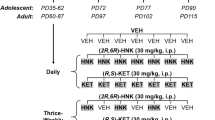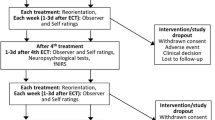Abstract
Rationale
N-methyl-d-aspartate (NMDA) receptor antagonists (e.g., PCP, ketamine) have been shown to impair learning/memory. Well documented in animal models, only limited research in humans has been reported. Findings to date are similar to results of animal studies; however, antagonists are typically administered before the learning experience. This may be problematic as memory failure could be secondary to inattention induced by the psychotomimetic effects of these drugs and/or alterations in sensory processing which can degrade the quality of the stimulus, thereby affecting the accuracy of recall.
Objective
The objective of the study is to compare the effects of ketamine vs placebo on recall for words when administered after stimulus presentation.
Methods
In this double-blind crossover study, 24 normal controls were given bolus injections of ketamine (0.3 mg/kg) or placebo. Immediately prior to infusion, subjects were administered a verbal memory test. Delayed recall was measured 45 min postinfusion. Mental status changes were assessed using the Brief Psychiatric Rating Scale.
Results
Subjects experienced a significant increase in psychiatric symptoms that peaked at 20 min. Results indicate no differences between the drug and placebo conditions for the memory task. However, reminiscence (i.e., recall of previously unrecalled items with repeated testing) was significantly reduced following ketamine administration compared to placebo.
Conclusions
Findings suggest that aspects of memory consolidation are affected by drugs that interfere with NMDA receptor function.

Similar content being viewed by others
Notes
This increase did not appear to come at the expense of the number of words recalled. Seven subjects experiencing reminiscence in the placebo condition experienced either no change or an increase in the absolute number of words recalled. However, two subjects experienced declines of two to three words, while four other subjects experienced a single word decline.
References
American Psychiatric Association (1987) Diagnostic and statistical manual of mental disorders (revised), 3rd edn. American Psychiatric Association Press, Washington, DC
American Psychiatric Association (1994) Diagnostic and statistical manual of mental disorders, 4th edn. American Psychiatric Association Press, Washington, DC
Benton AL, Hamsher K de S, Varney NR, Spreen O (1983) Contributions to neuropsychological assessment. Oxford University Press, New York
Bliss TV, Collingridge GL (1993) A synaptic model of memory: long-term potentiation in the hippocampus. Nature 361:31–39
Brandt J (1991) The Hopkins verbal learning test: development of a new memory test with six equivalent forms. Clin Neuropsychol 5:125–142
Butelman ER (1989) A novel NMDA antagonist, MK-801, impairs performance in a hippocampal-dependent spatial learning task. Pharmacol Biochem Behav 34:13–16
Danysz W, Wroblewski JT, Costa E (1988) Learning impairment in rats by N-methyl-d-aspartate receptor antagonists. Neuropharmacology 27:653–656
DeLeonibus E, Lafenetre P, Oliverio A, Mele A (2003) Pharmacological evidence of the role of dorsal striatum in spatial memory consolidation in mice. Behav Neurosci 117:685–694
Erdelyi MH (1996) The recovery of unconscious memories: hypermnesia and reminiscence. University of Chicago Press, Chicago
Ferreira G, Gutiérrez R, De la Cruz V, Bermúdez-Rattoni F (2002) Differential involvement of cortical muscarinic and NMDA receptors in short- and long-term taste aversion memory. Eur J Neurosci 16:1139–1145
Flood JF, Morley JE, Lanthorn TH (1992) Effect on memory processing by d-cycloserine, an agonist of the NMDA/glycine receptor. Eur J Pharmacol 221:249–254
Gandolphi O, Dall’Olio R, Roncada P, Montanaro N (1990) NMDA antagonists interact with 5-HT-stimulated phosphatidylinositol metabolism and impair passive avoidance retention in the rat. Neurosci Lett 113:304–308
Ghonheim MM, Hinrichs JV, Mewaldt SP, Petersen RC (1985) Ketamine: behavioral effects of subanesthetic doses. J Clin Psychopharmacol 5:70–77
Harborne GC, Watson FL, Healy DT, Groves L (1996) The effects of sub-anaesthetic doses of ketamine on memory, cognitive performance and subjective experience in healthy volunteers. J Psychopharmacol 10:134–140
Harris JA, Biersner RJ, Edwards D, Bailey LW (1975) Attention, learning, and personality during ketamine emergence. Anesth Analg 54:169–172
Harris EW, Ganong AH, Cotman CW (1984) Long-term potentiation in the hippocampus involves activation of N-methyl-d-aspartate receptors. Brain Res 323:132–137
Hetem LA, Danion JM, Diemunsch P, Brandt C (2000) Effect of a subanesthetic dose of ketamine on memory and conscious awareness in health volunteers. Psychopharmacology 152:283–288
Honey RA, Turner DC, Honey GD, Sharar SR, Kumaran D, Pomarol-Clotet E, McKenna P, Sahakian BJ, Robbins TW, Fletcher PC (2003) Subdissociative dose ketamine produces a deficit in manipulation but not maintenance of the contents of working memory. Neuropsychopharmacology 28:2037–2044
Igaz LM, Vianna MR, Medina JH, Izquierdo I (2002) Two time periods of hippocampal mRNA synthesis are required for memory consolidation of fear-motivated learning. J Neurosci 22:6781–6789
Jones KW, Bauerle LM, DeNoble VJ (1990) Differential effects of σ and phencyclidine receptor ligands on learning. Eur J Pharmacol 179:97–102
Krystal JH, Karper LP, Seibyl JP, Freeman GK, Delancey R, Bremner JD, Heninger GR, Bowers MB, Charney DS (1994) Subanesthetic effects of the noncompetitive NMDA antagonist, ketamine, in humans. Arch Gen Psychiatry 51:199–214
Lahti AC, Weiler M, Michaelidis T, Parwani A, Tamminga CA (2001) Effects of ketamine in normal and schizophrenic volunteers. Neuropsychopharmacology 25:455–467
Levin H, Benton A, Grossman R (1982) Neurobehavioral consequences of closed head injury. Oxford University Press, New York
Malhotra AK, Pinals DA, Weingartner H, Sirocco K, Missar CD, Pickar D, Breier A (1996) NMDA receptor function and human cognition: the effects of ketamine in healthy volunteers. Neuropsychopharmacology 14:301–307
Martin SJ, Grimwood PD, Morris RGM (2000) Synaptic plasticity and memory. Annu Rev Neurosci 23:649–711
McGaugh JL (2000) Memory—a century of consolidation. Science 287:248–251
McGaugh JL, Dawson RG (1971) Modification of memory storage processes. Behav Sci 16:45–63
McGaugh JL, Herz MJ (1972) Memory consolidation. Albion Publishing, San Francisco
Meeter M, Murre JM (2004) Consolidation of long-term memory. Psychol Bull 130:843–857
Monaghan DT, Bridges RJ, Cotman CW (1989) The excitatory amino acid receptors. Annu Rev Pharmacol Toxicol 29:365–402
Morris RG, Enderson E, Lynch GS, Baudry M (1986) Selective impairment of learning and blockage of long-term potentiation by N-methyl-d-aspartate receptor antagonist AP5. Nature 319:774–776
Murray EA, Bussey TJ (2001) Consolidation and the medial temporal lobe revisited. Hippocampus 11:1–7
Newcomer JW, Krystal JH (2001) NMDA receptor regulation of memory and behavior in humans. Hippocampus 11:529–542
Newcomer JW, Farber NB, Jevtovic-Todorovic V, Selke G, Kelly A, Williams F, Craft S, Olney JW (1996) NMDA glutamate receptor hypofunction: a model for schizophrenia-like cognitive and behavioral symptoms. Paper presented at Society for Neuroscience 26th annual meeting, November, Washington, DC
Newcomer JW, Farber NB, Jevtovic-Todorovic V, Selke G, Melson AK, Hershey, T, Craft S, Olney JW (1999) Ketamine-induced NMDA receptor hypofunction as a model of memory impairment and psychosis. Neuropsychopharmacology 20:106–118
Overall JE, Gorham DR (1962) The brief psychiatric rating scale. Psychol Rep 10:799–812
Øye I, Paulsen O, Maurset A (1992) Effects of ketamine on sensory perception. J Pharmacol Exp Ther 260:1209–1213
Payne DG (1987) Hypermnesia and reminiscence in recall. Psychol Bull 101:5–27
Rockstroh S, Emre M, Tarral A, Pokorny R (1996) Effects of the novel NMDA-receptor antagonist SDZ EAA 494 on memory and attention in humans. Psychopharmacology 124:261–266
Roediger HL, Payne DG (1982) Hypermnesia: the role of repeated testing. J Exp Psychol 8:66–72
Roediger HL, Weldon MS, Challis BH (1989) Explaining dissociations between implicit and explicit measures of retention: a processing account. In: Roediger HL, Craik FIM (eds) Varieties of memory and consciousness: essays in honour of Endel Tulving. Erlbaum, Hillsdale, NJ, pp 3–39
Rose SP (2001) Time-dependent processes in memory formation revisited. In: Gold PE, Greenough WT (eds) Memory consolidation. APA Press, Washington, DC, pp 113–127
Rossato JI, Bonini JS, Coitinho AS, Vianna MR, Medina JH, Cammarota M, Izquierdo I (2004) Retrograde amnesia induced by drugs acting on different molecular systems. Behav Neurosci 118:563–568
Russell WR, Nathan PW (1946) Traumatic amnesia. Brain 69:280–300
Seigel S (1956) Nonparametric statistics for the behavioral sciences. McGraw Hill, New York
Shapiro ML, Caramanos Z (1990) NMDA antagonist MK-801 impairs acquisition but not performance of spatial working and reference memory. Psychobiology 18:231–243
Sharma AC, Kulkarni SK (1991) Effects of MK-801 and ketamine on short-term memory deficits in passive avoidance step-down task paradigm in mice. Methods Find Exp Clin Pharmacol 13:155–159
Shimizu E, Tang YP, Rampon C, Tsien JZ (2000) NMDA receptor-dependent synaptic reinforcement as a crucial process for memory consolidation. Science 290:1170–1174
Spitzer RL, Williams JB, Gibbon M, First MB (1989) Structured clinical interview for DSM-III-R. New York Psychiatric Institute, New York
Squire LR (1987) Memory and brain. Oxford University Press, New York
Staubli U, Thibault O, DiLorenzo M, Lynch G (1989) Antagonism of NMDA receptors impairs acquisition but not retention of olfactory memory. Behav Neurosci 103:54–60
Wesierska M, Macias-Gonzalez R, Bures J (1990) Differential effect of ketamine on the reference and working memory versions of the Morris water maze task. Behav Neurosci 104:74–83
Zechmeister EB, Nyberg SE (1982) Human memory. Brooks/Cole Publishing, Monterey, CA
Acknowledgements
The authors would like to thank the patients and staff of the Residential Treatment Unit of the Maryland Psychiatric Research Center for their participation in this project. This work was supported, in part, by the National Institute of Mental Health Grant (MH CRC 40279).
Author information
Authors and Affiliations
Corresponding author
Rights and permissions
About this article
Cite this article
LaPorte, D.J., Blaxton, T.A., Michaelidis, T. et al. Subtle effects of ketamine on memory when administered following stimulus presentation. Psychopharmacology 180, 385–390 (2005). https://doi.org/10.1007/s00213-005-2179-5
Received:
Accepted:
Published:
Issue Date:
DOI: https://doi.org/10.1007/s00213-005-2179-5




